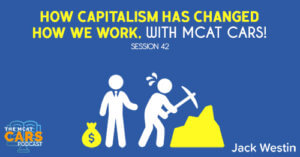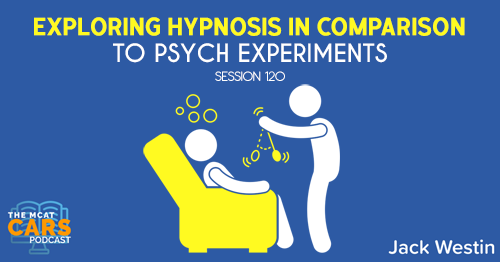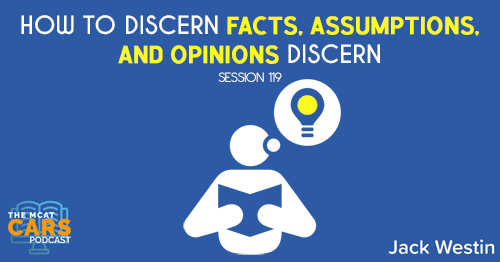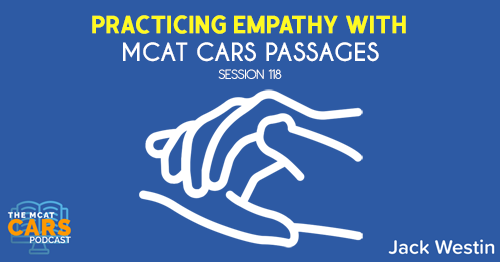Apple Podcasts | Google Podcasts

Session 42
Work has been a part of human history. How has the invention of capitalism changed it? This passage has economics, politics, and opinion.
Jack Westin joins us once again as we break down another passage bit by bit to help you get the score that you deserve!
Link to article:
Before capitalism, there was work. Before markets, before even money, there was work. Our remotest ancestors, hunting and gathering, almost certainly did not see work as a separate, compartmentalized part of life in the way we do today. But we have always had to work to live. Even in the 21st century, we strive through work for the means to live, hence the campaign for a “living wage”.
As a species, we like to define ourselves through our thoughts and wisdom, as Homo sapiens. But we could as easily do so through the way we consciously apply effort towards certain goals, by our work – as Homolaborans. It nonetheless took two revolutions, one agricultural, one industrial, to turn “work” into its own category.
Industrial capitalism sliced and diced human time into clearly demarcated chunks, of “work” and “leisure”. Work was then bundled and packaged into one of the most important inventions of the modern era: a job. From this point on, the workers’ fight was for a job that delivered maximum benefits, especially in terms of wages, in return for minimum costs imposed on the worker, especially in terms of time.
For Karl Marx, the whole capitalist system was ineluctably rigged against workers. Whatever the short-run victories of the trade unions, the capitalist retained the power; the ultimate control, over workers’ time. And the worker would remain forever alienated from their work. The goal was to assert sovereignty over our own time, free of the temporal control of the capitalist, able “to hunt in the morning, fish in the afternoon, rear cattle in the evening, criticise after dinner”.
The problem of alienation is far from solved. Only one in three American workers say they feel “engaged” with their work. But in terms of material conditions of life, across the broad sweep of economic history, capitalism has delivered pretty well for most workers. Wages rose, hours fell, life (mostly) got better. Global poverty halved. As an economic system, socialism fell from grace, and, by and large, and in spite of recent rhetoric on the American political left, continues to fall.
Listen to this podcast episode with the player above, or keep reading for the highlights and takeaway points.
[02:30] A Brief overview of Today’s Passage
This passage is about the economy. Specifically, it establishes a truth and a way of life. It discusses the pros and cons of people who change that way of life. This is a common theme throughout MCAT passages. They will define something a certain way and they will describe why it’s good or bad.
[03:11] Paragraph 1, Sentence 1
Before capitalism, there was work.
Jack says:
Most economy passages have something to do with capitalism, marxism, socialism, etc. Ultimately, it doesn’t matter as long as you know that there was work before this idea of capitalism.
[04:00] Paragraph 1, Sentence 2
Before markets, before even money, there was work.
Jack says:
This is another way of looking at capitalism. They’re educating you about money and market.
[04:15] Paragraph 1, Sentence 3
Our remotest ancestors, hunting and gathering, almost certainly did not see work as a separate, compartmentalized part of life in the way we do today.
Jack says:
It implies that today, work is separate from our lives in some ways. This is further establishing that work has always been with us.
[04:55] Paragraph 1, Sentence 4
But we have always had to work to live.
Jack says:
It just says that working and living go together.
[05:04] Paragraph 1, Sentence 5
Even in the 21st century, we strive through work for the means to live, hence the campaign for a “living wage”.
Jack says:
It says here that work is an essential part of the human experience. It’s the truth the author is establishing. It’s not a fact, but an argument. It’s something that the author wants you to know. You have to know that the author cares about work and how work is really a part of us.
[06:04] Paragraph 2, Sentence 1
As a species, we like to define ourselves through our thoughts and wisdom, as Homo sapiens.
Jack says:
This is a transition where you just have to go with it. Don’t be afraid just because the author is going in a new direction. So just keep reading.
[07:07] Paragraph 2, Sentence 2
But we could as easily do so through the way we consciously apply effort towards certain goals, by our work – as Homolaborans.
Jack says:
Homolaborans doesn’t exist but the author is trying to say that humans are working. It goes back to the idea of how humans work all the time. It’s part of our lives.
[07:59] Paragraph 2, Sentence 3
It nonetheless took two revolutions, one agricultural, one industrial, to turn “work” into its own category.
Jack says:
This goes back to the first paragraph when the author is saying how living and working used to be the same. And now, there’s that separation.
[08:52] Paragraph 3, Sentence 1
Industrial capitalism sliced and diced human time into clearly demarcated chunks, of “work” and “leisure”.
Jack says:
Not only is it industrial or agricultural revolution, but you can also connect it to capitalism. The author could be using these terms and you should know that they all symbolically mean the same thing. They all refer to a new way of life or some kind of change in society.
[09:50] Paragraph 3, Sentence 2
Work was then bundled and packaged into one of the most important inventions of the modern era: a job.
Jack says:
The author is pointing to what came out of industrial capitalism, which denotes separation – job vs leisure. Before, there was no separation. But now, there’s that.
[10:25] Paragraph 3, Sentence 3
From this point on, the workers’ fight was for a job that delivered maximum benefits, especially in terms of wages, in return for minimum costs imposed on the worker, especially in terms of time.
Jack says:
The author is discussing most people’s lives where they have a job and they have time off. There’s this idea that we have to work. Then we have to have fun. Why can’t we have fun and work at the same time? Why did these capitalist societies separate work from having fun?
[11:30] Paragraph 4, Sentence 1
For Karl Marx, the whole capitalist system was ineluctably rigged against workers.
Jack says:
We’re given a name here and you don’t have to know who Karl Marx is. But what you know is this guy is going against the capitalist system. He’s against jobs vs. leisure. He doesn’t want that separation.
[12:24] Paragraph 4, Sentence 2
Whatever the short-run victories of the trade unions, the capitalist retained the power; the ultimate control over workers’ time.
Jack says:
The first sentence read that “ineluctably rigged against workers” and so the author says that Karl Marx believed that workers are being taken advantage of.
Regardless of the unions that workers have, capitalists end up winning anyway. Anyone who separates the job from leisure is winning somehow.
You don’t have to worry so much about this. As long as you know we’re discussing the negatives here and problems with capitalist society, then you’re okay.
[13:54] Paragraph 4, Sentence 3
And the worker would remain forever alienated from their work.
Jack says:
It says that capitalist people have ultimate control over the worker’s time. These workers are just working. And that’s the alienation. They’re being taken advantage of.
[14:48] Paragraph 4, Sentence 4
The goal was to assert sovereignty over our own time, free of the temporal control of the capitalist, able “to hunt in the morning, fish in the afternoon, rear cattle in the evening, criticise after dinner”.
Jack says:
The alienation is the transfer of ownership of our time. We’re being sold like goods. In this case, Marx is saying we don’t want to be sold as if we’re goods. We like to control our own time. We want to do what we want to do.
[15:35] Paragraph 5, Sentences 1-2
The problem of alienation is far from solved. Only one in three American workers say they feel “engaged” with their work.
Jack says:
This capitalist power or alienation is still a problem.
[15:53] Paragraph 5, Sentence 3
But in terms of material conditions of life, across the broad sweep of economic history, capitalism has delivered pretty well for most workers.
Jack says:
The author is saying that although 1 in 3 people are engaged with work, capitalism has done a lot to make our lives better.
[16:33] Paragraph 5, Sentence 4
Wages rose, hours fell, life (mostly) got better.
Jack says:
These are just more examples of how capitalism helped.
[16:42] Paragraph 5, Sentence 5
Global poverty halved.
Jack says:
The author is saying how it’s helping poverty.
[16:47] Paragraph 5, Sentence 6
As an economic system, socialism fell from grace, and, by and large, and in spite of recent rhetoric on the American political left, continues to fall.
Jack says:
Capitalism has done good. But there still is this problem.
[17:48] The Main Idea
The author doesn’t like this kind of association to work. You don’t have to assume anything else. You just have to know this is how work was and how it’s becoming. And it’s a problem to some degree.
[18:54] Sample Question and Thought Process
The author’s primary purpose is to:
(A) argue against the separation of work and leisure
(B) suggest that bosses should treat workers better
(C) advocate for a world where people need not work
(D) explain people’s current relationship to their work
The correct answer is D. It’s very general. But for a question that’s so vague, a general answer is also best.
You don’t really argue against the separation of work and leisure. This may be implied but to argue against it means you basically say something negative about the separation between work and leisure.
In general, the passage is just about how people worked and how that separated. This talks about the relationship of it. So D fits this passage the best.
[21:25] Understanding the Wrong Answer Choices
C is the worst answer. This is actually contradicting the author. The author said there is work and there is always going to be work. It’s part of us. So this is out.
B suggests that bosses should treat workers better. This is not bad. But this is not the primary point of this passage. The author never even said this. The passage is about work and how it’s associated with our lives.
'You're really thinking about these answer choices and why they could be right or wrong. That's critical thinking.'Click To TweetJack says that in critical thinking, you’ve got to use your brain and it’s going to hurt a bit. It’s going to make you tired. And the only way to do this is to read the passage well. Otherwise, you’re going to be stuck.
[23:20] Jack Westin
Check our Jack Westin’s free daily CARS passages right in your email inbox!
Links:
Link to article:
SEARCH SITE
SEARCH SITE
LISTEN FOR FREE











